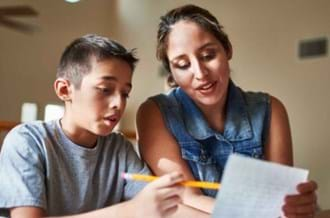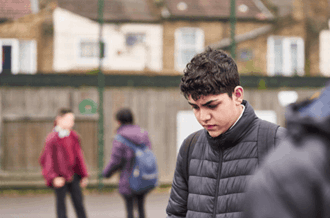Supporting the mental health of LGBTQ+ young people
Supporting the mental health of LGBTQ+ young people
LGBTQ+ young people experience poor mental health at a disproportionate rate. Here, we share some resources where you can learn how to better support LGBTQ+ young people who might be struggling.
In April 2021, Just Like Us surveyed 11 to 18-year-olds and found that LGBT+ young people are twice as likely to experience depression, anxiety and panic attacks than those who are not LGBT+.
Research by the Mental Health Foundation found that members of the LGBTQ+ community are more likely to experience poor mental health, with 50% experiencing depression and 3 in 5 experiencing anxiety. But it's also important to note that being LGBTQ+ doesn't automatically mean someone will have mental health issues.
Whether you're a parent, carer, teacher, school staff member, friend or family member, there's much more we can do to support LGBTQ+ young people, such as:
- tackling stigma
- addressing discrimination
- helping young people in their coming out journeys
- supporting young people who are struggling with their identity.
We've pulled together a selection of useful articles and resources to help you do this.
Resources for families
Parenting Smart – positive gender identity development
Learn how to support your child to develop their sense of self if they're confused about their gender identity.
Parenting Smart – sexual development
Learn how you can support your child through the different stages of sexual development, including helping them to understand:
- their sexual orientation
- their gender identity
- what their minds and bodies will go through as they develop.
Strong Family Alliance – Parent Guide to coming out
Learn how you can support your child through their coming out journey.
Resources for schools
Created for Children's Mental Health Week 2018, this resource includes activities to explore what makes each of us special and unique.
Mentally Healthy Schools – LGBTQI+ children and young people
Curated by Anna Freud National Centre for Children and Families, Mentally Healthy Schools has advice, information and resources to help schools and colleges to support LGBTQI+ communities. Included is a helpful resource on celebrating differences for the early years.
Just Like Us – School Diversity Week
Discover how you can celebrate LGBT+ equality in primary and secondary schools and access School Diversity Week educational resources to help you along the way.
Stonewall – schools & colleges
Resources to help make your school, college or setting more LGBTQ+ inclusive.
Resources for young people
Switchboard provides a one-stop listening service for LGBT+ people on the phone via email and Instant Messaging. Call 0300 330 0630, between 10am-10pm daily, to speak to one of their trained volunteers.
This hub is full of advice and tips for LGBTQ+ young people thinking about their futures and next steps.
Helpful information for young people covering a range of different things such as coming out, faith and religion, and staying safe.
Other resources you may find useful
Anna Freud National Centre for Children and Families – LGBTQI+ mental health
News & blogs

A proactive approach to children's mental health support
Dr Simon Opher MP outlines what approach he thinks the Government should take to improving children's mental health.
Read more
Why self-awareness is as important in parenting as it is for children
We share examples of how self-awareness can help you grow as a parent and get the best out of you and your child.
Read more
Walking through pain
Place2Be's Programme Leader for Family Work, Judah, reflects on his experience of the importance of listening.
Read more



